First-time Scottish Muslim playwright Hammaad Chaudry recently tackled issues related to Islamophobia, religion and immigrant family dysfunctionality in his off-Broadway production called An Ordinary Muslim. Staged in February and March 2018 at the New York Theater Workshop, the timely play looks at the traumas of dislocation among the children of Pakistani Muslim immigrants in England in a post-9/11 world.
Two Washington University alumni were cast in the production: Sanjit De Silva, AB ’98, in the lead role of Azeem Bhatti, and Sathya Sridharan, AB ’09, as local mosque leader Hamza Jameel. In March, the two actors sat down on set for an interview with fellow alumnus Arsalan Iftikhar, AB ’99, JD ’03, founder of TheMuslimGuy.com and senior fellow for The Bridge Initiative at Georgetown University. The three men discussed the off-Broadway play, the trajectory of their careers and the impact that the university has had on their lives.
ARSALAN IFTIKHAR: Please tell us a little bit about your background. Where did you grow up?
SATHYA SRIDHARAN: I was born in St. Louis, Missouri, at Barnes-Jewish Hospital and raised in the West County suburb of Ballwin. My parents were immigrants from South India who settled in the U.S. in the ’80s. My dad was actually a professor at WashU in civil engineering for 35 years, and my sister also went to WashU.
IFTIKHAR: So you’re a WashU family?
SRIDHARAN: (laughs) Yes, we are a WashU family.
SANJIT DE SILVA: I was born in Colombo, Sri Lanka. After civil war broke out there, my family moved to Uganda. After war broke out in Uganda, we then moved to Nairobi, Kenya. Eventually, I moved to the United States at age 10 when my mother took a job at the United Nations, so then we moved to Queens. After war broke out in Queens (laughs), we moved to Stamford, Connecticut, where I eventually went to middle school and high school.
IFTIKHAR: When did you know that you wanted to be an actor?
DE SILVA: I didn’t know for a while. Like many South Asian parents, my mother and father wanted me to be a doctor, to attend a Top 20 university geographically close to my uncle [who happens to live in St. Louis]. Since WashU met all those requirements, I applied early decision and never looked back. I was a biology major who slowly started to get involved in drama. And about six months before I was to take the MCAT, I decided that I didn’t want to become a doctor.
So I started doing film. I made a film while at WashU that won an award, and then I became an intern for Spike Lee’s production company, 40 Acres and a Mule Filmworks. Then I basically had to tell my parents that I didn’t want to become a doctor and that instead I wanted to pursue a career as an artist.
SRIDHARAN: In the back of mind, I always thought that I would become an actor. I hear that I came out of the womb making jokes, and as a kid, I was always trying to become the center of attention. I performed in plays all throughout middle and high school, always getting jealous if I didn’t get the lead role (laughs). I was on my way to becoming an academic, but my parents were very supportive when I decided to become an actor.
IFTIKHAR: What made you choose Washington University?
SRIDHARAN: Like Sanjit, I also applied early decision to WashU. Because my dad was a WashU professor, I always associated higher education with WashU’s campus. It was the most beautiful place in the world to me as a kid growing up in St. Louis.
IFTIKHAR: Who were some of your mentors in the WashU drama department?
DE SILVA: Andrea Urice, Bill Whitaker and Annamaria Pileggi were very important to my growth as an actor.
SRIDHARAN: All of those people Sanjit mentioned, and I would also add Jeffery Matthews, who was my first-year acting teacher. And, of course, Henry Schvey, who directed me in a production of Hamlet my senior year, which was very instrumental in my becoming an actor.
IFTIKHAR: What was your first major acting role after you graduated from WashU?
SRIDHARAN: I took two years off and went to graduate school to study acting. While at NYU, I got to work on Richard III, and that was probably the most memorable role I played after leaving WashU.
DE SILVA: I still didn’t know that I wanted to be an actor, so I was a production assistant for the Spike Lee movie Summer of Sam. Then I became a scenic design production assistant for the Andy Kaufman movie Man on the Moon, starring Jim Carrey. I actually thought that I wanted to be a filmmaker, so I wanted to learn the nuts-and-bolts of movies. Yet, while I was watching these actors in front of the camera, I kept thinking to myself: “Oh, no! I think I actually want to be an actor!” So, after working on Man on the Moon, I took acting classes and did really, really bad off-off-off-off-Broadway theater trying to support myself. However, I did a Shakespeare Lab at the Public Theater, which was taught by NYU Graduate Acting teachers. That changed my life forever.
IFTIKHAR: Do you generally prefer stage, television or film roles as your primary platform?
SRIDHARAN: There is something really special about being on-stage in front of a live theater audience. Nothing compares to that feeling of having an audience breathe with you in the same room, laugh with you or even just share a silence together. For these reasons, theater is the most primal form of storytelling to me.
DE SILVA: Ironically, my first major role was playing a doctor on television, which made my South Asian parents very happy. As an actor though, what I trained for was the stage. The theater is the one medium where you — the actor — are the main storyteller, whereas television and film are mainly directors’ media.
IFTIKHAR: What has been your most memorable role in your acting career thus far?
SRIDHARAN: The role of Hamza Jameel for An Ordinary Muslim is my biggest role yet. I always knew that I would have made it as an actor when I performed a play at this theater [New York Theater Workshop].
DE SILVA: I agree. This play is the biggest [lead] role that I have ever had. This is the most personal to me: as a South Asian, as an immigrant, as someone who has dealt with these societal issues in the West, trying to understand my own identity as an American. What culture do I belong to? This play asked those tough questions, and it was sincerely one of the best experiences of my theatrical life thus far. It’s actually a joy to be on stage with an all-South Asian cast, since that never happens either. Typically, I am the token brown guy in a play (laughs).
IFTIKHAR: What made you decide to audition for An Ordinary Muslim? How did you hear about the play? What drew you to the script?
DE SILVA: I have been attached to the script for more than two years. Tony Kushner [who won the 1993 Pulitzer Prize in Drama for his award-winning Broadway play Angels in America] personally called my agent to ask if I could do a reading for this new play that he was mentoring. I said “yes” immediately, mainly because you say “yes” to anything Tony Kushner asks (laughs).
SRIDHARAN: I heard about this play from Sanjit while I was with my girlfriend watching a production of The Iceman Cometh with [Tony Award winner] Nathan Lane. Sanjit and his wife were sitting behind us, and during every intermission, Sanjit kept telling me that I should audition for this role in An Ordinary Muslim. And so I did.
IFTIKHAR: For An Ordinary Muslim, what background research did you conduct for your respective roles as Azeem and Hamza that helped you bring them to life?
DE SILVA: Boy, there was a lot. The play revolves around a Pakistani British Muslim family in West London. So I had to do a lot of research on Islam, particularly the Tablighi Jamaat [a group that proselytizes to fellow Muslims]. I also did research on West London, especially learning the nuanced linguistic accents and more about the historical legacy of Partition [when India and Pakistan split into two countries in 1947]. But a lot of this role is just who I am. I know the immigrant experience. I know colonialism very intimately.
SRIDHARAN: I put a lot of my attention in learning about the Tablighi Jamaat. Since my character, Hamza, is the austere young leader of the local mosque, I tried to carry that lived experience into the room. I’m not Muslim, so it was an honor for me to explore that experience and not just take the play’s word for it.
IFTIKHAR: What do you hope audience members will take away as some major themes of this play?
SRIDHARAN: In general terms, if you don’t understand the immigrant experience, this play allows you to see the inside of a family that you might not have crossed paths with before. For me, it’s about finding the similarities in the differences and seeing what it means to be the “other” in society, and broadening people’s apertures in general.
“This play grapples with politics, colonialism, racism. But ultimately, this play is about family and how everyone has to navigate the dysfunctionalities of their own family.”
— Sanjit De Silva
DE SILVA: I would venture to say that theater in New York has never seen characters like these people, and so this is a seminal moment for American theater. This play grapples with politics, colonialism, racism. But ultimately, this play is about family and how everyone has to navigate the dysfunctionalities of their own family. I want Muslims, Desis [South Asians], white people — all people — to be able to say, “That’s my family!” Because it is only in the specificity of things that you can actually see the universal commonalities.
IFTIKHAR: In the Donald Trump era of issuing Muslim travel bans and growing Islamophobia, why do you think plays like An Ordinary Muslim are important to our Western societal discourse?
DE SILVA: Wow, good question, Arsalan. This play is so important because it speaks to the zeitgeist of our global moment. Addressing the Islamophobia and anti-Muslim sentiment — viewing Islam as a monolithic entity — this play breaks that apart. So this play is challenging what Donald Trump is doing in many ways by breaking these monolithic stereotypes.
And I grew up around diverse groups of Muslims — people who brought us biryani during Ramadan, for example — so to be able to represent my friends to audiences who might not have experienced those cultures is a political act. In my opinion, putting brown bodies on stage is a political act.
“This play is seminal because it also shows a brown South Asian domestic family as normal human beings. And I agree that humanizing the ‘other’ is a massive political act.”
— Sathya Sridharan
SRIDHARAN: This play is seminal because it also shows a brown South Asian domestic family as normal human beings. And I agree that humanizing the “other” is a massive political act.
IFTIKHAR: What advice would you give to WashU students who seek a career in the arts today?
SRIDHARAN: Say “yes” to any opportunity that comes your way. Every time you say “yes,” you are going to learn something new.
DE SILVA: To be honest, the career of acting is a hard one. It’s not called “show art”; it’s called “show business.” It’s a marathon and not a sprint, and you need luck. You should always work on your craft, all the time, but make your life and family more important than your career. You will receive more rejections than approval, but always remember that your self-worth is much more than being an actor.
Arsalan Iftikhar, AB ’99, JD ’03, is also an international human rights lawyer and author of SCAPEGOATS: How Islamophobia Helps Our Enemies and Threatens Our Freedoms, which President Jimmy Carter called “an important book that shows Islamophobia must be addressed urgently.” Iftikhar was awarded the Distinguished Young Alumni Award from WashU in 2013.
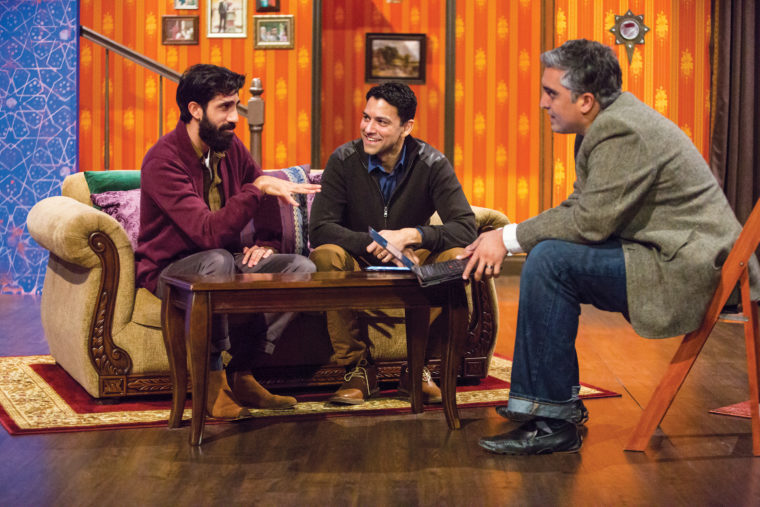
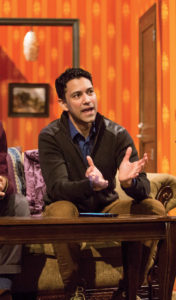
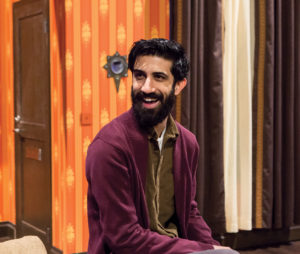
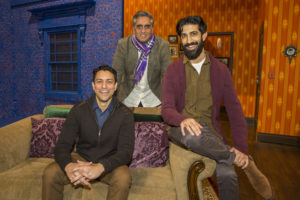
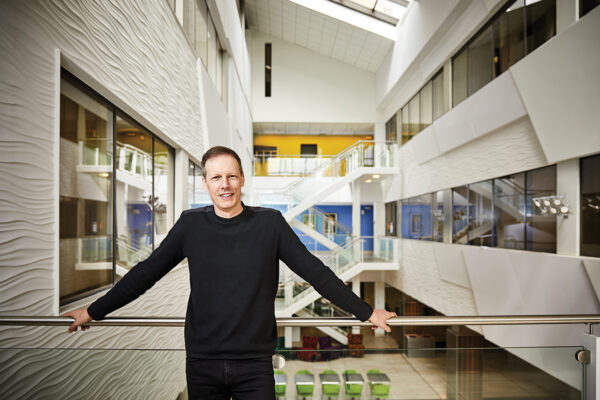
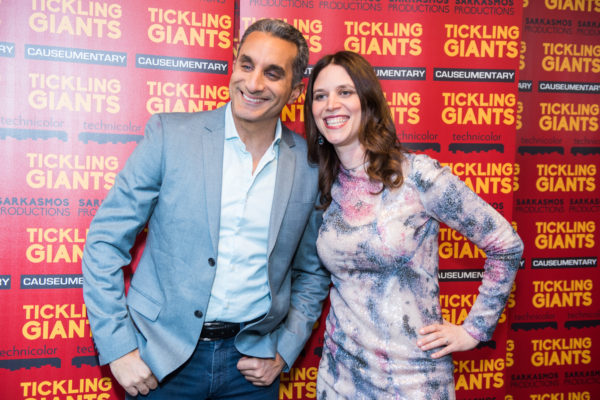
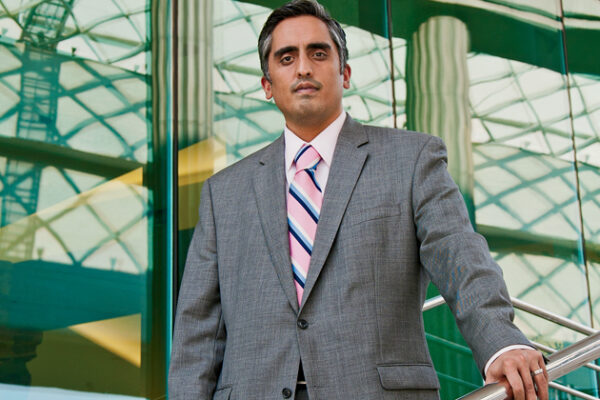
Comments and respectful dialogue are encouraged, but content will be moderated. Please, no personal attacks, obscenity or profanity, selling of commercial products, or endorsements of political candidates or positions. We reserve the right to remove any inappropriate comments. We also cannot address individual medical concerns or provide medical advice in this forum.